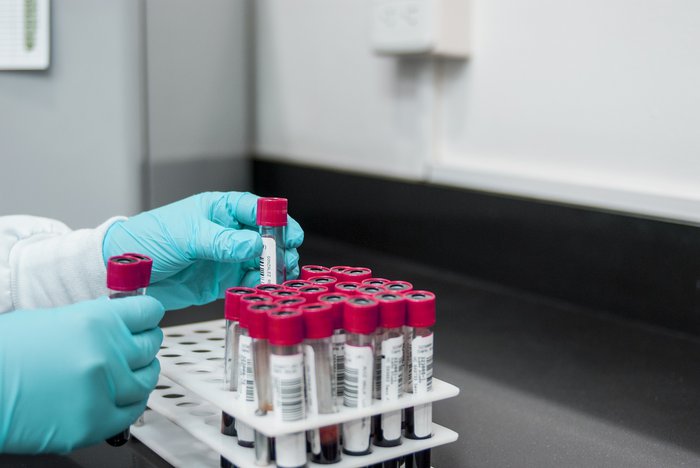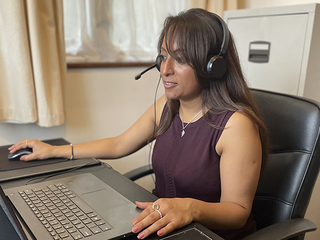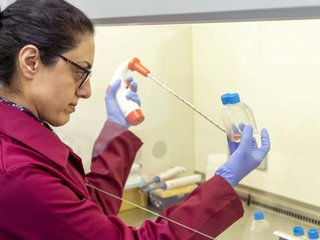What's the latest on Evusheld?
Many people living with blood cancer will be deeply disappointed by the news that the Government will not make Evusheld available until an appraisal (a full assessment) of the drug has been completed. We are also devastated by this announcement and are continuing to campaign for it to be bought and made available on the NHS immediately. Here's an update on what we’re doing, along with some information about the context of the Government's decision.
Updated 24th Oct 2022 to reflect the next stage of the NICE appraisal

What is Evusheld? Is it effective?
Evusheld is an investigational drug – meaning that it’s still being studied – that aims to prevent people from getting infected with Covid-19, and also to reduce the chances of becoming seriously ill with Covid-19. Because its main use is to prevent Covid, it’s categorised as a preventative or prophylactic drug. While the main clinical trials testing Evusheld were conducted against the Delta variant of the virus, newer research has shown that it’s still effective against BA.1 and BA.2, but less effective against BA.4 and BA.5 and might not be effective against BQ.1 and BQ.1.1 (which are the dominant variants in autumn 2022. We wrote a previous blog post on this topic.
As of 19th October 2022, Evusheld is being made available privately in the UK. We have more information about accessing Evusheld privately, and what we are doing to lobby for free access.
Who is conducting the appraisal?
Evusheld was authorised for use in the UK in March of this year, but the Department of Health has decided not to buy any doses until a full appraisal of its clinical- and cost-effectiveness has been conducted. The body responsible for appraisals is called NICE, or the National Institute for Health and Care Excellence. Normally, new drugs are appraised by NICE, who then make recommendations as to whether and, if so, how the NHS should deploy the drug. The Government then buys – or ‘procures’ – the drug, and it is made available to patients on the NHS, following NICE’s recommendations.
For Covid treatments, this has been done differently. Covid treatments are fast-tracked by a multi-agency initiative called RAPID C-19. This initiative includes representatives from agencies and organisations in all four nations, who monitor drugs and ongoing clinical trials and quickly develop guidance and policies to enable safe and effective Covid drugs to be made available to the public as quickly as possible. This initiative is how drugs like sotrovimab, remdesivir, and Paxlovid were made available rapidly.
NICE was created in 1999 so that decision-making about new drugs was free from the influence of politics and lobbying. It took these decisions out of Ministers’ hands, so that the media, campaigns, and pharmaceutical companies wouldn’t have undue influence over the process. For Evusheld, we believe this has not been handled correctly by Ministers who delayed referring this topic to NICE for far too long, risking lives in the meantime. However, the NICE process is an important one. It means that the decision of whether or not to buy Evusheld will be made transparently, because the public will see exactly how the drug has been evaluated for clinical and cost-effectiveness.
What was announced?
Evusheld is being monitored and evaluated through the RAPID C-19 route, but it has not been fast-tracked at the same speed as other Covid treatments have. On August 12th, an announcement was made that the NICE appraisal will be finished in May 2023, and that the Government will not buy it or make it available until that process is complete. While this is still somewhat quicker than most drugs are normally appraised, this process is much slower than for other Covid treatments. We’re happy to see that our campaign has led to the Health Minister asking NICE to speed up their appraisal process. We hope to hear a response from NICE soon.
We are deeply disappointed by this announcement. Preventative drugs are an essential tool to protect people with blood cancer who are at high risk from Covid, alongside existing measures like vaccination, treatments used once someone catches Covid, and other measures like mask-wearing in hospitals. While there are other preventative drugs being tested that we’re keeping a close eye on, such as in the PROTECT-V trial, Evusheld is the furthest developed, is supported by an enormous body of evidence, and has already been rolled out in 33 other countries. We are committed to our campaign to make Evusheld available to people with blood cancer on the NHS.

Worried about anything or have questions?
If you need someone to talk to, please don't hesitate to contact our Support Service by phone or email.
What is Blood Cancer UK doing?
We’ve been asking the Government to do two things: (1) to buy Evusheld and make it available on the NHS and (2) to publish the analyses they conducted that led to their decision not to buy it until the NICE appraisal is finished. This is really important, because it would enable us to hold them accountable for their decision.
First, we’re putting pressure on the Government through the media. We’ve been featured on Radio 4’s Today Programme who broke the story, BBC North West evening news and the Victoria Derbyshire programme, and we’ve been quoted in BBC News, the Guardian, the Daily Mail, POLITICO, and iNews – and are conducting more interviews each day. We’ve also launched a large media campaign for Evusheld, that attracted attention in all major newspapers.
Secondly, we’re in close contact with officials in the Department of Health to gather more insight into how they made their decision, and why. We’re putting pressure on officials by writing again to the Secretary of State, outlining the impact this decision has and will have on our community. The Secretary of State has responded to this letter, and has published the analysis made by RAPID C-19 which led them to decide not to buy Evusheld. While we believe they should been transparent throughout their decision-making process, these publications are a welcome step forward. We also disagree with some of the points in the Secretary of State’s letter, and have responded outlining our position.
And third, we’re making sure that the needs and concerns of our community are taken into account throughout the NICE appraisal process. Because we’re an influential and well-known patient support organisation, we’re an official consultee in this process. We’ve already submitted evidence to the first and second stages of the appraisal.
What has Blood Cancer UK sent to NICE?
During the scoping review phase (phase 1), we sent comments on their current plans for the appraisal with suggestions that would ensure Evusheld is evaluated in an appropriate way. These suggestions fall under three key themes: the threshold used to measure cost-effectiveness, inequality, and how we believe it should be given to patients. For more information on each, see the section at the bottom of this post entitled ‘Our NICE submission’. We included many more suggestions and arguments than are outlined here, including that Evusheld should be made available to the widest number of people with blood cancer possible, and that the appraisal should be completed with urgency for individual and public health reasons.
For the second phase, we sent a more detailed submission outlining the unmet needs of our community, and how Evusheld would benefit people living with blood cancer. We’re grateful for the evidence that you’ve sent us, and have incorporated it carefully. You can read our submission here
What has Blood Cancer UK been doing until now?
Since AstraZeneca (who manufactures Evusheld) announced results from the clinical trials in August of last year, we’ve described Evusheld as a potential gamechanger for people with blood cancer, calling on it to be approved and rolled out urgently. In March, after it was approved, we publicly called on the Government to set out its plans to buy Evusheld in the media and on our website. In May, we asked you to support our campaign by writing to your MPs. When enough data emerged to show its effectiveness against BA.1, we again called on the Government to buy Evusheld – and did so again when enough data showed its effectiveness against BA.2.
When we heard that a decision on Evusheld was going to be made imminently, we paired up with the patient group Evusheld for the UK, Dr Lennard Lee, and the All-Party Parliamentary Group on Vulnerable Groups to Pandemics. Together, we produced an open letter to the Secretary of State for Health – jointly signed by 18 charities – and a clinical consensus statement signed by 125 clinicians representing 17 different specialities calling for the Government to buy Evusheld. We used these documents to raise awareness of Evusheld by circulating it widely in the media, including in the Mail on Sunday and ITV Granada.
For months, we’ve been working with parliamentarians and officials to show them that many people with blood cancer don’t feel safe enough to start getting back to normal. We’ve also been sharing information and briefings with parliamentarians who are also campaigning for the Government to buy Evusheld, such as Wes Streeting MP, Daisy Cooper MP, and Bob Blackman MP. This led to a 12 October debate on Evusheld, led by Daisy Cooper. We’ve made sure that the needs and concerns of people with blood cancer are not forgotten, by showing that the Covid vaccines aren’t always as effective in some people with blood cancer, and that there are serious issues with how the current Covid treatments are being rolled out.
What can I do?
We’ve updated our template letter to MPs to reflect the current situation, and you can download it using this link.
You can find out who your local MP is, and their contact details, using the find your MP website. You can also write to your MSP, MS, or MLA if you live in Scotland, Wales, or Northern Ireland, asking them to write to the Health Secretary or Minister in your nation.
For more information on what you can do to protect yourself from Covid, head to our Covid information pages or have a look at our latest Ask the Experts roundtable on Covid vaccines, treatments, and Evusheld. If you need any support, or just want to chat through some questions or concerns, we want to hear from you. You can give us a call at 0808 2080 888 or send us an email.
Our phase 1 NICE submission
Measuring cost-effectiveness
The way that NICE measures a drug’s cost-effectiveness is called ‘cost per QALY’ or cost per quality-adjusted life-year. Essentially, they measure a host of different factors contributing to health-related quality of life – including socioeconomic and mental health aspects, such as those resulting from shielding – and determine how many years of life a drug provides, while also factoring in the quality of those additional years.
Evusheld is somewhat unique because it is a drug that aims not to treat a patient’s underlying condition (i.e., blood cancer) but to prevent an infection. A drug that effectively treats blood cancer, for instance, will be seen as prolonging life and improving the quality of that life, because the patient’s health will improve as a result of taking that drug. With Evusheld, however, we believe the threshold of what constitutes a ‘healthy life’ should be lowered to account for the fact that most of those who will be eligible for the treatment are living with a condition that does not mean they are in perfect health, and that their underlying condition will not improve as a result of taking this drug.
Inequality
We also argued that Evusheld will be more clinically- and cost-effective in some groups than in others. This isn’t an argument that only some people with blood cancer should be eligible, but instead that the measurement NICE uses needs to take these differences into account. For example, by NICE’s method of measurement, Evusheld will be more cost-effective in someone for whom getting infected with Covid would disrupt life-prolonging cancer treatment.
There is also significant inequality in mortality rates from Covid-19, access to vaccines, access to Covid treatments after testing positive, and many other key aspects of the protection programme for people who are at high risk. People living in the most deprived areas, and/or of certain ethnicities are least likely to access vaccines, least likely to be given Covid treatments when they test positive, and most likely to die from a Covid infection. We argued that both clinical and non-clinical risk factors for Covid need to be considered, to show that one measure of cost-effectiveness isn’t representative of everyone’s circumstances.
How Evusheld should be given to patients
If Evusheld is bought and made available on the NHS, we are determined to ensure that the mistakes made in other treatment rollouts aren’t repeated. For this reason, we strongly promote the deployment of Evusheld in the secondary care setting, by specialist and haematology teams. Both vaccines and current Covid treatments are mostly available through external settings like vaccination centres or Covid-19 Medicines Delivery Units. There are some serious problems with these sites, and how these drugs have been given, that mean that some people with blood cancer haven’t been able to access the drugs and vaccines they need to stay protected from Covid. We explained in detail why it’s important that Evusheld is primarily given through specialist teams, while also noting that it needs to be equitably accessible to all those who are eligible.

Fund blood cancer research
The day we beat blood cancer is now in sight, but we need your help to get there.
